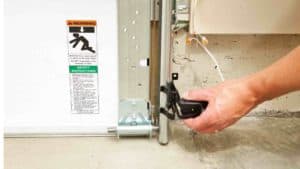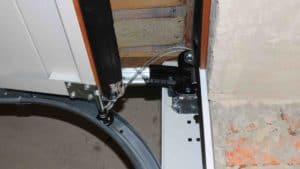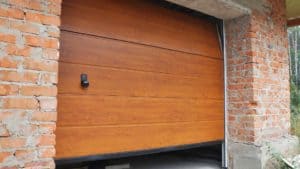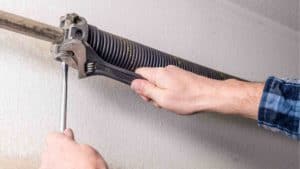A garage door may only be one part of your home’s features, but it can be a major inconvenience when it doesn’t function properly. Without it, you may find a garage vulnerable to the elements and potential intruders.
If your garage door won’t close, it’s best to understand what’s causing the issue and take the necessary steps to fix it. At Garage Door Repair, we look at your garage door’s role in keeping your home safe and secure and help you get it back on track.
Reasons a Garage Door Won’t Close All The Way
It can be frustrating when you can’t figure out why your garage door won’t close. If you’re currently dealing with this problem, here are some of the most common garage door-related damages and issues you should check on:
1. Obstructed Door
Garage doors work by using sensors to determine if an object is in the way of the door closing. If there is anything blocking the sensor, even if it’s not in the way of the door closing, this will cause the door to have issues closing.
There’s always a chance that something as simple as a piece of furniture could be getting in the way of your garage door. Take a look around or inside the garage to see if there are any potential obstructions.

2. Malfunctioning and Misaligned Safety Sensors
Your garage door has built-in safety sensors. When garage doors close, these sensors detect any objects in the path of the garage and will stop the garage from closing. If these sensors aren’t working properly, your garage could be stuck open or unable to close completely.
Similar to the solution above, first check if anything is in the way of the sensor. If you have determined that nothing is blocking the sensor, it might be that the sensors themselves are out of alignment.
Here’s a simple way to check: take a look at the exterior LED light when you press the button to close the door. If the light is green, your sensors are in good shape. But if the light starts flashing red, that means the sensors need some attention. Don’t worry, it’s a quick fix! Just inspect the bracket or tighten a screw on the flashing sensor. Once you’ve done that, the red light should turn green, the flashing should stop, and your garage door should close smoothly once again
If this doesn’t fix the issue, it’s time to check the lens itself. Sometimes all it takes is a quick wipe with a clean cloth to get them back in working order. These sensors play a crucial role in keeping your garage door functioning smoothly, but dirt, spiderwebs, and other debris can cause them to fail.
By simply giving the lenses a quick cleaning, you can ensure that your door operates without a hitch. If you live in a particularly dusty area, make sure to give your sensors a regular clean to keep them functioning perfectly.
Lastly, check the wires connecting your garage door to its sensor. Your garage door sensor system’s wires are your trusty connection to the outside world, but with all the wear and tear from regular use, inclement weather, and even pesky critters, they might start to show signs of wear and tear.
Don’t worry, though! If you see any signs of water damage, chew marks, or other suspicious tampering, you can easily replace the wires and keep your garage door sensor system in tip-top shape.
3. Damaged Springs
There are two main types of garage door springs, extension and torsion. Extension springs are mounted on the sides of the track, extending and contracting when the door is in motion. Torsion springs on the other hand run horizontally and hold two cable drums at each end – the torsion spring plays a crucial role in the smooth opening and closing of your garage door.
Although they are different, they serve the same purpose. Storing tension when the door is closed and releasing it when you lift the door open.
This means that most of the time, your garage door springs are under tremendous tension. Overtime materials will break down and eventually the springs will break.
If this has happened to you, don’t worry, the pros at Garage Door Repair know how to fix it and will have your garage door springs working in no time at all.
Additionally, if you do decide to take on the project yourself, the video below provides a wonderful explanation on how to do so.
4. Damaged Cables
Depending on the type of spring system your garage door uses, extension or torsion, the location of your cables will change.
In the case of a torsion spring system, the cables are connected to the door drum on each side of the shaft and work by rotating a winding cone to lift the door. When the door lowers, the process reverses.
On the other hand, the cables on an extension system are located inside the springs a to prevent any broken spring pieces from causing damage or harm.
Your garage door cables are hardworking components that help you open and close your garage door smoothly and effortlessly. However, just like anything else that’s used repeatedly, they can experience wear and tear and eventually break.
Age, rust, incorrect installation or configuration, and even an accidental bump can all contribute to the breakdown of your garage door cables. Fraying and pulley wear are also common issues.
Regular maintenance, careful usage, and quick repairs can help prolong the life of your garage door cables and keep your garage door functioning at its best.
If you have found yourself with broken door cables, be sure to reach out to a professional installer who can safely secure your garage door for years to come.

5. Damaged Tracks
Fixing a bent garage door track may seem like a DIY project, but it’s best to call in the experts. Trying to fix it yourself with tools and videos may only lead to bigger problems and even injury.
The professionals have the expertise and equipment to get the job done right, ensuring a smooth and safe operation for your garage door. Don’t risk making things worse, leave it to the experts to get your garage door back to its best.
Fix Garage Door Problems With Garage Door Repair
When a garage door won’t close, homeowners naturally want to fix the issue themselves. You can clear the way, set the limits, and clean and lubricate the parts. It’s possible, but garage door repairs require specialized tools and expertise. Depending on why your garage door won’t close, you can take the matter into your own hands or call garage door specialists for help.
If it’s simply a blockage or misaligned safety sensors, you can usually troubleshoot and solve the issue on your own. But if it’s beyond your skill set, it’s time to call the professionals. At Garage Door Repair, we work with professionals who identify the problem, fix it quickly, and get your garage door working again in no time.
We help homeowners with garage door issues of all kinds. Whether you need garage parts, replacements, or other garage door services, we can help. Your garage door is vital to your home and family’s security, so let’s help you make the most of your investment. Contact us now!


